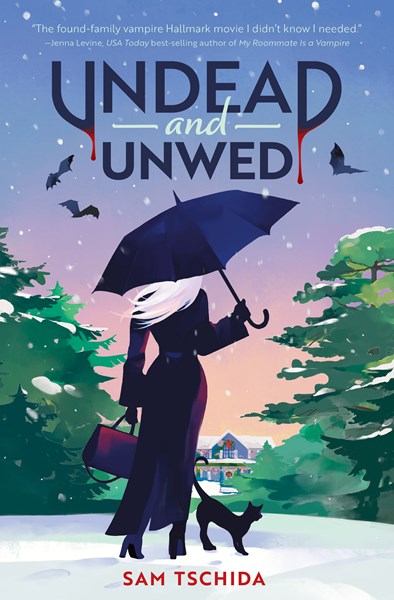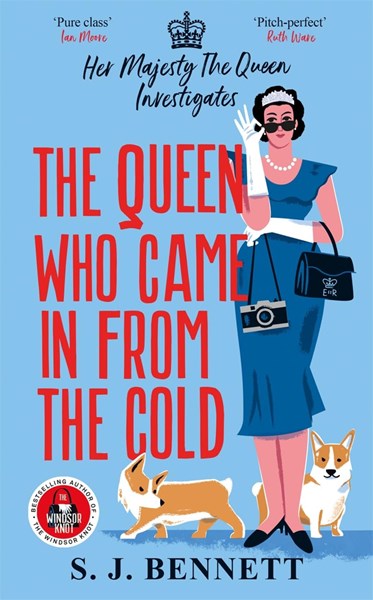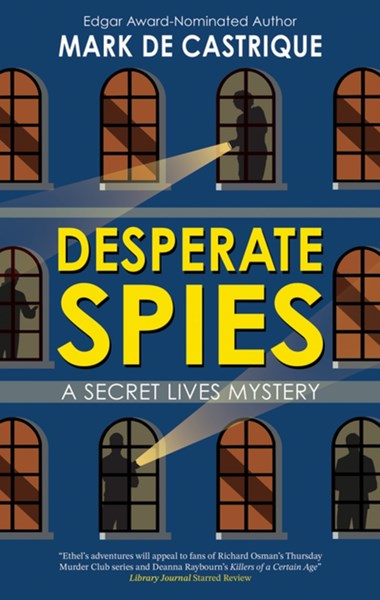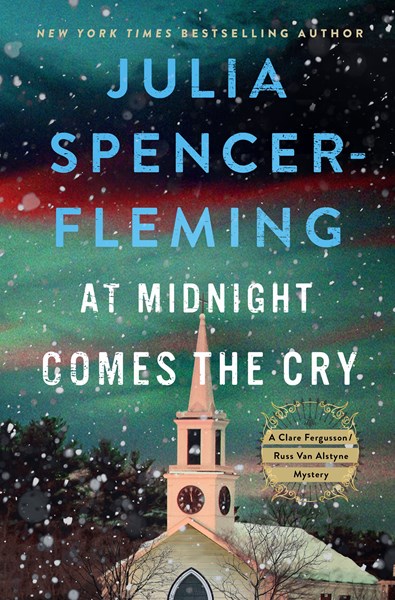Tiffenie is a 300-year old-vampire forced to live within the existence of Tiffany Amanda Blair, whose identity she recently purchased online. You see, this is a very modern vampire story. Undead and Unwed is set in dozens of Hallmark movie tropes—The Fixer Upper, The Perfect Snowy Date, The Bachelor Auction —in a small Vermont town where Tiffany has just inherited a dilapidated country house. But why now, and where is the real Tiffany? Having just lost her job at the plasma bank, Tiffenie picks up and moves with her roommate and newly minted vampire, Heaven, to Valentine to start new lives. Drinking coconut water instead of blood works, to some extent, but a gal can get thirsty, and when handsome Christmas-tree farmer Tyrone appears on the scene, Tiff’s undead body gets hot. Her irksome and devastatingly handsome ex Vlad keeps showing up, offering her eternal princesshood at his side, and decides to stay in Valentine. Everyone in town knows more about Tiffany Amanda Blair than Tiffenie does, and there is the matter of her ex-fiancé’s untimely death and his connection to Tyrone. Tiff’s sessions with the town therapist, during which she tries to convince Dr. Rosetti that she is an actual vampire, are hilarious. When the town inspector threatens to condemn the house that Tiff and Heaven plan to turn into a B&B, he suffers a regrettable injury and starts to dig deeper into Tiffany Amanda Blair. Blackmail, small-town minds, and mean girls meet found family, true love, and Hallmark happiness in this campy, little-bit-steamy, and entertaining tale.
Review
It doesn’t take long for van de Sandt’s plot and writing to grip readers’ attention in this debut. Two timelines interweave around the circumstances of a single dinner party, set to celebrate the launch of Franca’s fiancé, Andrew’s, latest project, a canon of sorts inspired by time capsules. Franca once aspired to have a career, but it is clear that Andrew prefers a more domestic arrangement for her. Her father died while she was quite young, and her mother is distant, so her life with Andrew feels safe, initially. In his discussion with Franca over what should be served at the dinner party, Andrew throws off a mean vibe, even insisting that Franca get fresh rabbit to prepare, despite knowing she is a vegetarian. Kitchen disasters up the tension, and when one unexpected guest arrives, a friend of hers from Utrecht, the wrenching details of Franca’s relationship with Andrew are slowly revealed as the timeline shifts forward and back. Claustrophobic and thrilling at the same time, the book allows readers to follow Franca’s unwinding as she seeks revenge against the man who says he loves her, when he just wants to own her, body and soul. Readers will feel every bit of Franca’s female rage as she attempts to extricate herself from her untenable situation. At a time when “tradwife” movements are on the rise, which prioritize homemaking and caring for the husband, trusting him to provide and protect, this story is particularly relevant.
This fifth in the series featuring Queen Elizabeth as an amateur sleuth is even more credible, more captivating than its predecessors—and they were awfully good. It’s 1961, deep into the Cold War, and the queen is headed north aboard the royal train, along with Princess Margaret and their respective entourages, when one of the ladies-in-waiting claims to have seen a murder unfold from her carriage. Is this sighting for real or a case of ladies-who-drink-too much? The queen, along with her assistant private secretary Joan McGraw—she’s the thread who connects many of the books—takes on the possible murder, which then expands, threatening to spoil the queen’s state visit to Italy. (Here the action moves to the royal yacht, a delightful foray.) Bennett does a fabulous job of balancing the monarch’s role as head of state with her involvement in a tale that exposes the dark side of the post-war world. For fans of The Crown, the Marlow Murder Club series, Miss Marple, and Robert Lacey’s Majesty: Elizabeth II and the House of Windsor.
At 75 years old, retired FBI agent Ethel Fiona Crestwater returns for another case of digging up dirt and showing up perps. Ethel may have hung up her badge, but that does not make her any less active on the cases that impact the people closest to her, especially the steady stream of FBI agents she rents rooms to in her home. When an old colleague calls in a favor, she accepts without question. But as she dives deeper into the case, Ethel discovers that it originates in the very sting-operation-gone-bad that sent her into retirement, involving the murder of a college student and the Russian mob. Now, 18 years later, Ethel is back on the case with a new team and even more to lose. De Castrique’s (Secret Lives) sharp protagonist must use her skills and resources in the form of some tech-savvy spies, including Jesse, her beloved double-first-cousin-twice-removed, to keep state secrets out of the wrong hands once and for all. Fans of elderly sleuths will enjoy this political thriller, as well as Richard Osman’s Thursday Murder Club series and Deanna Rayborn’s Killers of a Certain Age.
Clare Fergusson and Russ Van Alstyne are now married and happy despite the innate differences of an ex-pilot Episcopal priest and a now-retired police chief. Son Ethan, eight months old, has a stay-at-home dad as a caregiver and things are relatively smooth until the annual Thanksgiving day parade is beset by white supremacists. Officer Knox, newest on the Miller’s Kill police department, is concerned about the disappearance of Syracuse PD officer Kevin Flynn, who was assigned to a state task force to infiltrate the sort of group that disrupted the parade. When Russ and Knox search the woods, two interesting new characters join their quest: Yixin Zhao, from the state attorney’s office; and Paul Terrance, from the park service. Clare is not left out, having taken on the task of saving an abused young mother whose husband is part of a supremacist group, and her child. With great outdoor scenes, tight plotting, and appealing characters, this will hold readers’ attention and leave them hungry for more.
Full-on brilliant, this sojourn into the groves of academe evolves into something totally dark and absolutely compelling. MFA grad David Trent is hanging around Cambridge cafes, reworking his novel for the umpteenth time, and lying to his fiance. It doesn’t help that his upstairs neighbor is Silas Hale, a renowned author who poses as a mentor when in fact he is nothing less than a monster who takes delight in torturing emerging authors (quite literally. In one of the funniest/most horrifying scenes, he refuses to supply David with any heat, despite it being winter in Boston.) But when David wins an award for his debut novel, everything changes, and even Silas is forced into welcoming his neighbor into the literary scene, albeit begrudgingly. From there, the novel, and David’s career, really take off. But enough from me. I refuse to let any of this devilishly satiric plot escape. Why take the fun away from other readers? Comparisons to Donna Tartt, Jean Hanff Korelitz, and Patricia Highsmith are inevitable. On my list of the top ten Best Books of 2025, this novel needs to be shared with a whole range of readers and enjoyed in book groups. They’ll be grateful.
In a clever standalone homage to Agatha Christie and other Golden Age authors, Edwards (Rachel Savernake series) invites “external observers” (i.e., readers) and “analysts” (reviewers) to participate in an interactive puzzle mystery-within-a-mystery set in a remote, snowbound Yorkshire village. The mysterious Midwinter Trust has brought six down-on-their-luck people with connections to crime fiction (including washed-out author Harry Crystal and laid-off book publicist Poppy de Lisle) to Midwinter village in the rugged Pennines to solve a fictional murder over the Christmas holidays under the close supervision of six Midwinter Trust employees. But the game soon goes awry when one of the guests, podcaster Baz Frederick, is found dead in a frozen creek; it is determined that he fell accidentally. But two more deaths are more than coincidental. Is a killer on the loose? As the players struggle to solve both the actual murders and the fictional one, readers can apply their own detective skills in deciphering the clues the author sprinkles throughout the podcast excerpts, text messages, journal entries, webpage excerpts, and third-person narrative. He even provides a Cluefinder (a nod to Golden Age detective fiction) but warns sternly that readers who cheat will be disqualified. If you love to play Clue and are a fan of atmospheric cozies, this is a fun, diverting read.
When Eden Fox goes for a run near her newly purchased rural English home, Spyglass House, all seems well. She and her husband, Harrison, love the huge old house and are beginning to settle into life in the village. Eden even has a show of her artwork planned at a local gallery. But all happiness and plans evaporate when she returns from her run and her key won’t work. Worse, another woman opens the door and claims she lives there and is Eden Fox. Eden’s husband says the same, and the police are called. In Feeney’s Beautiful Ugly alternating chapters, this bizarre story continues as we also meet police officer Olivia Bird, or Birdy, who is soon embroiled in her own mystery: a relative she didn’t know has died and left her a considerable inheritance. As part of it, Birdy discovers communication from a tech firm that promises to tell subscribers their death date. She and a kindly small town police officer investigate Eden Fox’s case, which soon turns into a missing-person investigation, one that’s surrounded by intriguing small-town goings on and MOST unexpected twists. A must for fans of Feeney’s absorbing novels and of Tana French’s work.
A quirky forensics expert and an undercover NYPD detective are thrown together here to solve a murder. Adrianna Kensington, daughter of nightclub kingpin Leopold Kensington, is putting together the wedding of the century on the family’s private island, Elysium, while her husband-to-be, tech bro Mark Li, gathers sponsorship deals. Her bridesmaids are all fellow alums of Kensington Manor, an elite all-girls school whose motto is “Discipline, Self-Restraint, and Godliness”—and all of them were with Dri three years ago when she was kidnapped and held captive for three days after her 21st birthday bash at Elysium. When crime-podcaster and bridesmaid Simone is found dead days before the wedding, everything is at risk—Adrianna’s reputation, social-media money, and the whole Kensington empire—and the kidnapper could be after the bride again. Holly was the forensics side of the podcast, and is asked to substitute for Simone at the wedding. Fitzwilliam, a cop as preppy as Holly is goth, tags along as her assistant. The story is told from alternating views of the wedding party, allowing readers to experience the cut-throat world of mean girls, reality-show nuptials, and bridezilla moments. A dark historical twist in the tropical paradise setting adds depth to this high-flying tale of money, murder, and secrets.
Ben Cross arrives for the first day at his new job in New York City and is promptly fired and escorted out by security. Upset and struggling to understand what happened, he barely catches the 1 train heading uptown from South Ferry station. As he sits on the train, his phone starts receiving text messages telling him not to turn it off or to leave the train. Further, if a particular man in the train car exits at the next station, the man will die. Ben doesn’t believe it, but when the man leaves and is promptly shot, Ben realizes the texts aren’t bluffing, and he was not picked randomly to play this demented game. Outside the train, NYPD detective Kelly Hendricks investigates the murder of a man who just got off the subway and learns of Ben Cross hijacking that very same train. What she’s hearing from her superiors and what her gut is telling her are in conflict, so she decides that confronting Ben directly will provide the answers she wants and perhaps save the lives of every person on board. Reid’s first novel to be published in the United States is a fantastic action thriller that reads like Die Hard mixed with Thomas Harris. The Survivor would make an excellent film as the story primarily takes place in a short amount of time. Readers will want to uncover Reid’s other novel, The Hunter, which was published in the UK, while never riding on the subway again.










